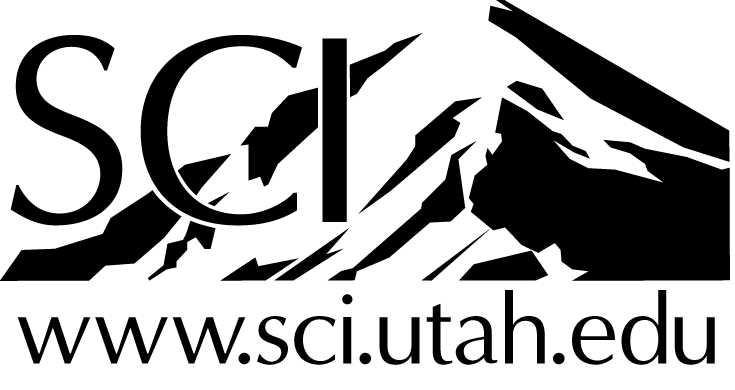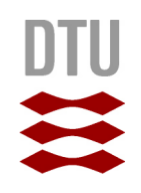Call for Papers
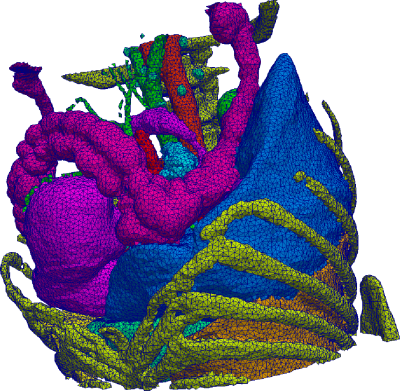
Many strategies for medical image analysis have been built on an
image analysis pipeline that starts with acquired image data,
performs filtering and processing, constructs geometric models of
important surfaces and structures, performs simulation, and finally
provides quantitative and visual analysis of the data. Within this
pipeline, geometry and shape are commonly represented as a mesh, or a
discretization of some domain into simpler computational elements such as
quads or triangles (representative of surface pieces) or tetrahedra and
hexahedra (representative of volumetric elements). This
image-to-mesh (I2M) step converts volumetric images into formats
that are more suitable for solving finite-element simulations, analyzing
critical structures, and performing boundary surface visualization tasks.
Current research in computational geometry, graphics hardware, and
computer graphics has produced methods to represent, extract, refine,
visualize and analyze both critical surfaces embedded in the 3D volumes,
such as interfaces between tissues, as well as volumetric regions, such as
organs.
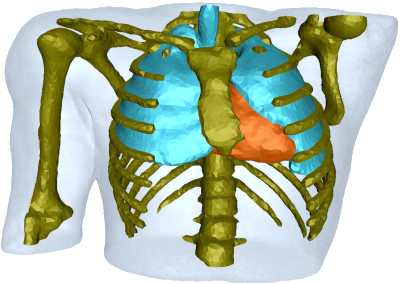
The workshop investigates the role meshes have with medical image
analysis and is broadly based on three overlapping themes:
- Mesh processing,
- The I2M pipeline,
- Surface analysis and extraction.
While numerous I2M technologies have been developed, rarely do they get
sufficient exposure so that out-of-field researchers have the necessary
expertise to know the nuances between them. Similarly, researchers in
geometry, meshing, and surfacing often consider their problems in
independent settings, external to their use in a particular pipeline.
In particular, there is a need for designing novel technologies that
strictly focus on medical image domains. This workshop proposes to
improve the cross-pollination of the imaging and meshing efforts by
considering how meshing fits into the end-to-end pipeline from image
acquisition to clinical analysis.
We invite papers on the following topics. There is a large overlap and we believe that many submissions may be classified into several categories that span these groups.:

Under the mesh processing topic:
- Mesh representations (triangles, tetrahedral, quads, implicit,
medial, parametric).
- Mesh extraction and regularization.
- Mesh registration.
- Meshing for FEM/BEM computation.
- Mesh generation of both multi-modal and segmented datasets.
- Quality metrics and mesh quality improvement techniques.
Under the I2M pipeline topic:
- Mesh and surface acquisition techniques including range scanning.
- Construction of volumetric meshes from surface meshes.
- Processing of acquired image data to make it more appropriate for
current meshing techniques.
- I2M algorithms/software for meshing image data.
- Post-processing of meshes to improve their applicability to
simulation and analysis.
- I2M visualization.
- Novel analysis areas that necessitate I2M conversion techniques,
for example, computational anatomy, electro-physical simulation, and
brain and neuro-science imaging.
Under the surface analysis and extraction topic:
- Surface feature extraction and matching.
- Surface warping and deformations.
- Shape and topology analysis.
- Tracking and surface evolution.
- Computing paths on surfaces (e.g. geodesics).
- Mappings between surfaces (e.g. conformal or harmonic maps).
- Symmetry analysis.
Paper Submission
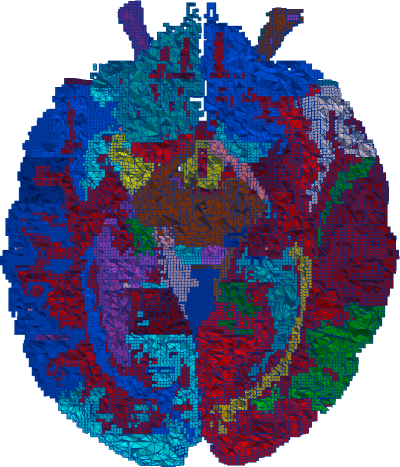 Paper Submission is closed. Thanks for all who submitted papers to the workshop.
Paper Submission is closed. Thanks for all who submitted papers to the workshop.
Papers will be published as proceedings and a USB key with papers will be given to the participants of the workshop. It is planned that selected papers will be included in a book written by one of the co-organizers.
There is an 8 to 12 page paper limit (8 pages recommende) and the papers should be formatted in the Springer LNCS style. Submissions should be formatted in PDF.
The papers will be subjected to a single blind review (they should not be anonymised) and each paper will be reviewed by two or three reviewers. The final decision will be given by the program comittee and the organisers.
The submission deadline for this workshop is set so it is possible to submit papers that are not accepted at the main MICCAI conference. However, simultanous submission to several MICCAI workshops is not accepted.
 Many strategies for medical image analysis have been built on an
image analysis pipeline that starts with acquired image data,
performs filtering and processing, constructs geometric models of
important surfaces and structures, performs simulation, and finally
provides quantitative and visual analysis of the data. Within this
pipeline, geometry and shape are commonly represented as a mesh, or a
discretization of some domain into simpler computational elements such as
quads or triangles (representative of surface pieces) or tetrahedra and
hexahedra (representative of volumetric elements). This
image-to-mesh (I2M) step converts volumetric images into formats
that are more suitable for solving finite-element simulations, analyzing
critical structures, and performing boundary surface visualization tasks.
Current research in computational geometry, graphics hardware, and
computer graphics has produced methods to represent, extract, refine,
visualize and analyze both critical surfaces embedded in the 3D volumes,
such as interfaces between tissues, as well as volumetric regions, such as
organs.
Many strategies for medical image analysis have been built on an
image analysis pipeline that starts with acquired image data,
performs filtering and processing, constructs geometric models of
important surfaces and structures, performs simulation, and finally
provides quantitative and visual analysis of the data. Within this
pipeline, geometry and shape are commonly represented as a mesh, or a
discretization of some domain into simpler computational elements such as
quads or triangles (representative of surface pieces) or tetrahedra and
hexahedra (representative of volumetric elements). This
image-to-mesh (I2M) step converts volumetric images into formats
that are more suitable for solving finite-element simulations, analyzing
critical structures, and performing boundary surface visualization tasks.
Current research in computational geometry, graphics hardware, and
computer graphics has produced methods to represent, extract, refine,
visualize and analyze both critical surfaces embedded in the 3D volumes,
such as interfaces between tissues, as well as volumetric regions, such as
organs.
 The workshop investigates the role meshes have with medical image
analysis and is broadly based on three overlapping themes:
The workshop investigates the role meshes have with medical image
analysis and is broadly based on three overlapping themes:
 Under the mesh processing topic:
Under the mesh processing topic:
 Paper Submission is closed. Thanks for all who submitted papers to the workshop.
Papers will be published as proceedings and a USB key with papers will be given to the participants of the workshop. It is planned that selected papers will be included in a book written by one of the co-organizers.
There is an 8 to 12 page paper limit (8 pages recommende) and the papers should be formatted in the Springer LNCS style. Submissions should be formatted in PDF.
The papers will be subjected to a single blind review (they should not be anonymised) and each paper will be reviewed by two or three reviewers. The final decision will be given by the program comittee and the organisers.
The submission deadline for this workshop is set so it is possible to submit papers that are not accepted at the main MICCAI conference. However, simultanous submission to several MICCAI workshops is not accepted.
Paper Submission is closed. Thanks for all who submitted papers to the workshop.
Papers will be published as proceedings and a USB key with papers will be given to the participants of the workshop. It is planned that selected papers will be included in a book written by one of the co-organizers.
There is an 8 to 12 page paper limit (8 pages recommende) and the papers should be formatted in the Springer LNCS style. Submissions should be formatted in PDF.
The papers will be subjected to a single blind review (they should not be anonymised) and each paper will be reviewed by two or three reviewers. The final decision will be given by the program comittee and the organisers.
The submission deadline for this workshop is set so it is possible to submit papers that are not accepted at the main MICCAI conference. However, simultanous submission to several MICCAI workshops is not accepted.
